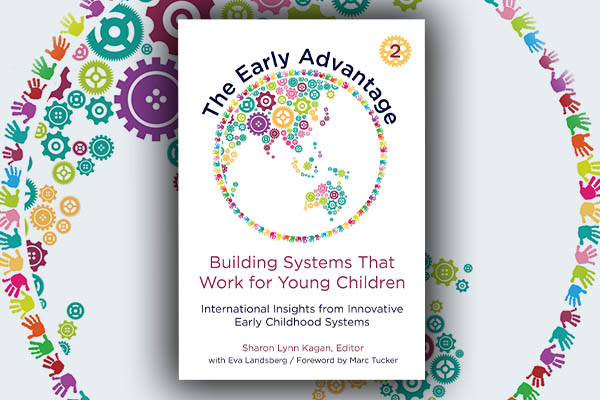The United States needs to rethink its approach to early childhood education and care (ECEC) based on the experiences of innovative systems around the world and develop a cohesive system that is high-quality, equitable, sustainable and efficient. This is the principal finding of the groundbreaking study from the National Center on Education and the Economy (NCEE), The Early Advantage. An event to release the study, which featured Caridad Araujo, principal economist at the Inter-American Development Bank, was held in Washington, DC, on May 16.
The study examines how innovative jurisdictions around the world are strategically and inventively designing and implementing early childhood policies and services to advance children’s well-being, and provides policy recommendations to help the U.S. expand the reach, equity and rigor of its early childhood offerings.
5 Pillars to Guide Early Childhood Education and Care
In the new book and centerpiece of the study, The Early Advantage 2: Building Systems That Work for Young Children, world-renowned early childhood researcher Sharon Lynn Kagan, her co-editor Eva Landsberg, and a team of international experts explore the ECEC systems of Australia, England, Finland, Hong Kong, Singapore, and South Korea, extracting essential elements from each of these innovative systems. The study found five common policy “pillars” in each jurisdiction:
- strong policy foundations
- comprehensive services, funding and governance
- knowledgeable and supported teachers and families
- informed, individualized, and continuous pedagogy; and
- data to drive improvement
There are also 15 “building blocks” or system elements that undergird the policy pillars.
These findings point to the “inconvenient truths” about early childhood education and care in the United States, according to Kagan, the Virginia and Leonard Marx Professor of Early Childhood and Family Policy and Director of the National Center for Children and Families at Teachers College, Columbia University. “Our study provides a guide for the U.S. – and countries around the globe – to improve their systems by focusing on the building blocks and pillars that serve as the cornerstones of early childhood education and care in the highest-performing jurisdictions in the world.”
A Blueprint Beyond A One-Size Fits All…
Although the study cautions that there is no one best early childhood system, the researchers identified common elements of the systems being developed by the jurisdictions of study. For example, the study found that these jurisdictions provide a comprehensive array of services for children and families, including prenatal and post-natal care, health care and early childhood education. The jurisdictions also practice “progressive universalism”: they provide resources for all children, but additional resources for those most in need.
In addition, they provide national frameworks for early childhood education that guide services for all programs, whether they are public or private. And while the pedagogy called for in the frameworks varies, they all are child-centered and play-based.
The study also found that these jurisdictions all place a critical emphasis on developing a strong early childhood workforce, including strategies for innovative professional development and retention. Many have common professional categories for teachers and other staff, and many are moving toward competency-based qualifications.
Moreover, the jurisdictions place a strong emphasis on using data to drive improvement. All collect data to monitor programs, and many rely on inspectors to gather information on program quality. But the purpose of such inspections is program improvement, not program closure. They also make at least some of the program monitoring data public to provide transparency.
What Next?
The findings of the study suggest some avenues the United States can take to strengthen its early childhood and care system. These include:
- Boldly address the inconvenient truths
- Be realistic about the U.S. context
- Bury the “one best strategy” approach
- Honor synergies to create a system and infrastructure that advances quality, equity, sustainability and efficiency
- Be more inventive about revenue generation and distribution
- Think about engaging both the public and private sectors
- Consider incentivizing quality, equity, sustainability and efficiency
- Focus on bridging policy and program gaps among ECEC services
- Create effective governance structures
- Use policy tools (e.g., frameworks, regulations, professional credentials) to create alignment among and continuity across programs
- Be more inventive about workforce preparation, compensation and deployment
- Create common levels and titles for the workforce that transcend states and programs
- Tie compensation to competence
- Deploy personnel flexibly
- Create a national curricular framework that focuses on quality, equity, sustainability and efficiency
- Focus on quality pedagogy for each and every child
- Incentivize the framework’s adaptation throughout the nation
- Use the framework to inspire improvements in monitoring, financing and professional preparation
- Focus on data for quality improvement
- Build comprehensive data systems that include provisions for the collection and use of data on children, families, programs, personnel and systems
- Foster a national research agenda on ECEC systems and their infrastructure.
Can these findings be applied to Latin American and Caribbean countries in their efforts to strengthen early childhood services? What are the real challenges and possibilities the region faces? Share your insights in the comments or mention @BIDgente on Twitter.
Lee el artículo en español.



Leave a Reply